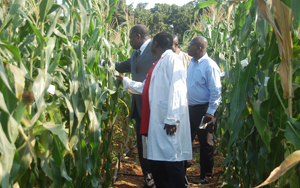The Vice-Chancellor of the University of Ghana, Prof. Ernest Aryeetey, has paid a visit to the West Africa Centre for Crop Improvement (WACCI) during which he interacted with Management, and was later conducted round the model farm by the Director, Prof. Eric Danquah, the Associate Director II, Prof. Vern Gracen, Programme Coordinator, Dr. Naalamle Amissah, Plant Breeders, Dr. Charles Thé and Dr. Martin Yeboah as well as officials from the College of Agriculture and Consumer Sciences (CACS).
Briefing the Vice-Chancellor on the Centre’s work, Prof. Danquah said the training at WACCI emphasises the needs of farmers in the West and Central African (WCA) sub-region. He reported that, the Centre has established a maize breeding programme to develop hybrid maize varieties with tolerance to drought, Striga infestation and acid soils in the humid forest areas in order to address the low productivity of maize in the sub-region.
Prof. Danquah noted that the Centre is acclaimed for being the institution in the sub-region with the highest number of PhD students in the area of plant breeding and genetics, adding that the current student population of 36 will increase to 44 with for the next enrollment in January, 2012.
On the second phase of the WACCI Project, Prof. Danquah said that discussions with donors were advanced and an additional 15 students would be admitted between 2013 and 2015. He stressed management’s determination to diversify the sources of funding for the programme and called for the Vice-Chancellor’s support in this regard.
The Vice-Chancellor, was impressed with the Centre’s performance and noted the importance of agriculture to society and the country’s economy. He noted that agriculture stood out as the foremost determinant of the University’s contribution to society vis-à-vis other sectors such as health and industry. He said the history of the University was closely linked to the beginnings of the College of Agriculture and Consumer Sciences, adding that a plant breeding programme has always been a major part of the ambitions of the University and pointed out that the Agricultural Research Stations were established along those lines.
The Vice-Chancellor stated his desire to see WACCI develop further into an institute and for it to work in tandem with other institutions within the College such as the Crop Science Department and Biotechnology Centre, as well as the Botany Department in the Faculty of Science. He lauded WACCI for its achievements within a relatively short time, its contributions to the University’s finances as well as its own financial position. . He said that there were high expectations from many parts of the world of what WACCI could do, not only for the sub-region but the African continent as a whole.
Professor Aryeetey described WACCI as one of the flagship institutions of the University, and challenged the Centre to showcase its successes such as the maize breeding programme at the forthcoming International Education Fair and Home-coming event planned for November this year. He further expressed his desire to work with the Management of WACCI to diversify its sources of funding and thus augment its resources to make plant breeding a major part of the University’s mandate. The Vice-Chancellor disclosed a plan to work with the Ministry of Food and Agriculture and Cabinet to approve a government-funded budget line for the next ten years to support the College of Agriculture and Consumer Sciences. He gave assurance that WACCI would receive its share from such a budget, which he pointed out would be additional to the subvention from the Ministry of Education.
The Vice-Chancellor later toured the Centre’s model demonstration farm and the maize breeding programme led by Dr. Charles Thé and Dr. Martin Yeboah. He interacted with the farm hands and 18 of the enrolled students currently taking their coursework at WACCI.
Faculty and staff from the College of Agriculture and Consumer Sciences and from other departments included the Deputy Provost, Prof. Daniel Obeng-Ofori, Dean of Graduate School, Prof. Kwadwo Ofori, Dean Acting Dean of the School of Agriculture, Prof. John Ofosu-Anim, Prof. Essie Blay, Prof. Frank Kumaga, Dr. Edmund Darkwa, Head of the Botany Department, Prof. Kwadwo Asante, the Director of Public Affairs, Mrs. Stella A. Amoa, the College Registrar, Mr. Peter Yarquah and College Finance Officer, Mrs. Nora Sowah.

Two students, Mrs. Vivian Oduro and Mr. Ernest Baafi, who spoke of the benefits of the programme, noted that they have been equipped with new knowledge and skills to develop improved varieties necessary to spark a green revolution in WCA. They appealed to the Vice-Chancellor and the University to help ensure that WACCI is sustained as a Centre of Excellence.&
On behalf of Management, Faculty, Staff, and students of the Centre, The Programme Coordinator, Dr. Naalamle Amissah expressed appreciation to the Vice-Chancellor for the visit. She reiterated the importance of sustaining WACCI as a Centre of Excellence.
The West Africa Centre for Crop Improvement, (WACCI), was established in June, 2007 with funding from the Alliance for a Green Revolution in Africa (AGRA) to train plant breeders at the PhD level for the West and Central African sub-region. It is based on the model of the African Centre for Crop Improvement (ACCI) of the University of KwaZulu-Natal, South Africa. The Centre was conceived through a partnership between the University of Ghana and Cornell University and has so far received over 6.5 million U.S. dollars for the first phase which ends in June 2012.
